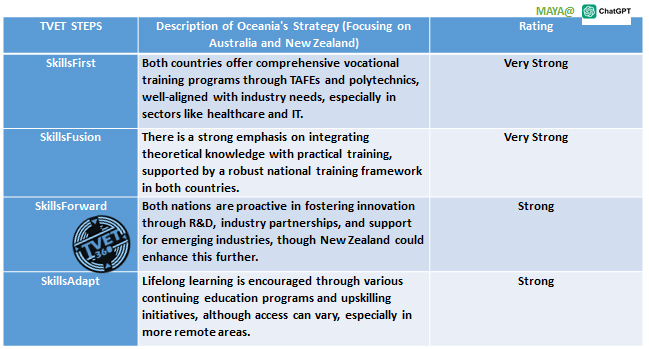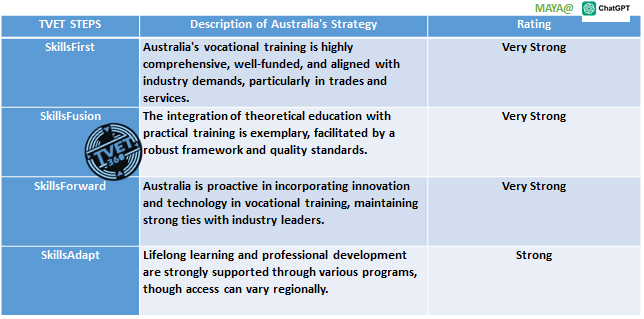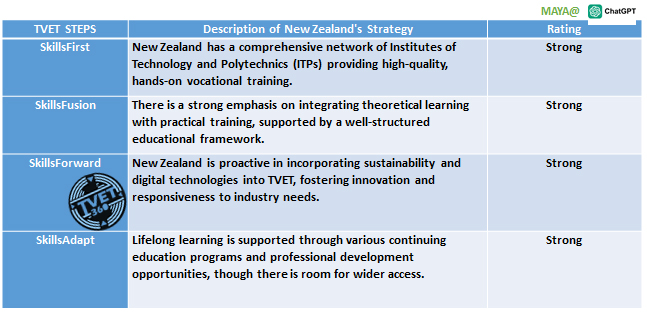3/11 - TVET STEPS and The Oceania Nations
 Nana Azhar
Nana Azhar
Summary
In evaluating the TVET strategies of nations in Oceania, it's important to note that this region includes a diverse group of countries, from highly developed nations like Australia and New Zealand to smaller island nations with varying levels of resources and development. Here, I'll focus on the general trends in TVET across more developed nations in the region, such as Australia, given their comprehensive and structured TVET systems:

Explanation:
SkillsFirst: Australia and New Zealand excel in providing practical, hands-on training that is highly relevant to the needs of their workforces. This training is supported by well-funded and well-managed institutions.
SkillsFusion: The educational systems in both countries successfully blend theoretical learning with practical applications, ensuring that students are well-prepared for employment.
SkillsForward: Innovation is a key focus, particularly in Australia, which invests heavily in technology and new methodologies in vocational training. New Zealand also supports innovation but has potential for more growth in this area.
SkillsAdapt: Both countries place a significant emphasis on lifelong learning, with extensive programs aimed at upskilling and reskilling. However, the reach of these programs can sometimes be limited in rural and remote areas.
To have a better look at how some nations fare within these region, let view several cases form this region.
CASE #1

Australia's TVET strategy across the TVET STEPS

Explanation:
SkillsFirst: Australia excels in providing practical, hands-on training that is highly relevant to the needs of its workforce. This is supported by Technical and Further Education (TAFE) institutions and numerous private RTOs (Registered Training Organizations) across the country.
SkillsFusion: The country's educational institutions seamlessly blend theoretical knowledge with practical skills, ensuring that students are well-prepared for their careers. This is underpinned by a national qualifications framework that enforces high standards.
SkillsForward: Innovation is a key aspect of the Australian TVET system, with ongoing efforts to integrate the latest technologies and teaching methodologies into the curriculum, thereby keeping pace with global trends and industry demands.
SkillsAdapt: Australia places a significant emphasis on lifelong learning, with extensive programs aimed at upskilling and reskilling. While these programs are generally effective, there are opportunities to enhance their reach and consistency across more remote areas.
CASE #2

New Zealand's TVET strategy across the TVET STEPS

Explanation:
SkillsFirst: New Zealand's vocational training is thorough and well-aligned with the needs of both local and international markets, especially in key sectors like agriculture, tourism, and technology.
SkillsFusion: The educational system effectively blends theoretical education with practical skills, ensuring that learners are well-prepared for employment. This is achieved through a curriculum that balances classroom learning with real-world application.
SkillsForward: Innovation is a hallmark of the New Zealand TVET system, with a particular focus on emerging technologies and sustainable practices, which are increasingly important in today's job markets.
SkillsAdapt: New Zealand has a strong focus on lifelong learning, with numerous programs aimed at upskilling and reskilling the workforce. However, there could be improvements in ensuring these opportunities are accessible to all segments of the population, particularly in more remote areas.
Overall, New Zealand's TVET system is robust, with strong performance across all stages of the TVETSTEPS R framework. The system is well-equipped to prepare learners for current and future workforce demands, though it could benefit from expanded access to continuing education and professional development programs.
Disclaimer
All evaluations conducted by TVET360 are for educational purposes only. Although these evaluations are valid and based on reliable sources, they are not intended to degrade, belittle, or criticize any country. We respect the unique strengths, cultures, and challenges of each nation. For the most accurate and personalized information, individuals should consult local experts, official sources, and consider the specific context of their situation.
Thank you for your time ❤️
Subscribe to my newsletter
Read articles from Nana Azhar directly inside your inbox. Subscribe to the newsletter, and don't miss out.
Written by
